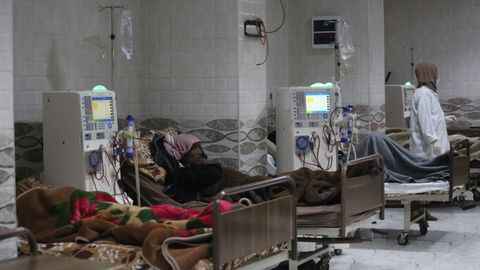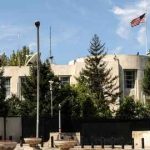Patients, especially the elderly, suffer as a result of the terrorist group’s ongoing attacks, while healthcare professionals find it difficult to function in a state of perpetual fear and anxiety.
In Syria’s Aleppo province’s Manbij district, ongoing attacks by the PKK/YPG terrorist group have seriously interrupted medical services.
When Manbij was freed from PKK/YPG captivity on December 9, 2024, as part of Operation Dawn of Freedom, the group’s attacks on residents and medical facilities left the city’s healthcare system in ruins.
Even after being expelled from Manbij, the organization still targets residential areas and civilians with bomb strikes, and the possibility of unexpected collapses brought on by PKK/YPG tunnels beneath the hospitals puts both medical facilities and residents at extra risk.
Manbij National Hospital dialysis patient Emin Abdo emphasized that patients are forced to travel to neighboring locations for treatment due to frequent power outages and generator fuel shortages.
Nearly 80% of necessary medications are not available, he continued. Abdo can only have his “Epoetin” injection once a week rather than three times due to high expenses and shortages.
“In addition to the shelling and missile strikes on the city of Manbij, car bomb attacks occur daily. These are the primary factors keeping aid from getting to us.
Military bases built out of hospitals
“PKK/YPG terrorists have destroyed the health care system,” Manbij’s health officer Emin Nur Elmeshed stated.
He emphasized that “hospitals have been converted into military bases” and pointed out the vast tunnels that have been excavated beneath hospitals.
Medical equipment and outdated medications were also left piled high in storage sections of healthcare facilities.
To improve health care services in the district, Elmeshed and his staff are in continuous communication with the Aleppo Health Directorate and the Health Ministry; nevertheless, they require assistance in addressing the drug shortage.
According to Hanadi Musa, head nurse of the intensive care unit at Manbij National Hospital, PKK/YPG-caused explosions are having a very negative impact on patients, especially the elderly, as they provoke widespread terror and anxiety.
She pointed out that the hospital’s intensive care unit is overcrowded due to the high volume of people hurt in explosions.
Musa urged authorities to create a safer working environment, highlighting the fact that healthcare personnel still carry out their tasks while experiencing constant fear and anxiety. “We want these explosions and bombings to stop,” she stated.
Over 40,000 people, including women, children, and the elderly, have died as a result of the PKK’s 40-year terror campaign against Turkey. The PKK is classified as a terrorist organization by the US, the EU, and Türkiye. It has a Syrian branch called the YPG.






